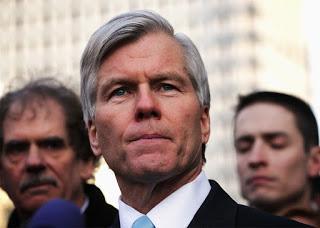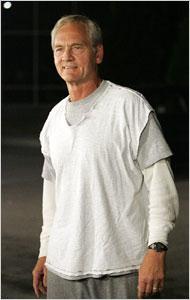
Robert McDonnell
(From slate.com)
In fact, Siegelman's best hope might have little to do with the McDonnell case and everything to do with the fact that trial judge Mark Fuller no longer is on the federal bench.
Appellate-court decisions often focus on narrow issues that might, or might not, apply to similar cases. Such rulings are written in a form that is . . . well, let's just say they hardly are models of clarity. Both of those qualifiers apply to McDonnell v. United States, which was issued yesterday morning (The opinion is embedded at the end of this post.), and that makes it difficult to come to solid conclusions about how it might apply to the Siegelman case.
First, McDonnell dealt almost entirely with this narrow question: Did McDonnell take "official action" to benefit a constituent (Jonnie Williams) who showered the governor and his wife with favors and more than $175,000 in gifts (Rolexes, designer clothes, catering for a daughter's wedding), apparently in hopes of receiving favorable action for his vitamin and dietary-supplement company.
The McDonnells helped arrange meetings for Williams with state university and health-care officials who might be able to help launch his products. Federal prosecutors argued that was an illegal "quid pro quo" -- the gifts (the "quid") in exchange for access to key state officials (the "quo"). But SCOTUS found that setting up meetings for Williams was part of everyday activity for a governor; it was not an official action, meaning their was a "quid" but no "quo."
In our coverage of the Siegelman case, plus a quick review of documents yesterday, I have not found any evidence that the "official action" question was raised. It appears that both sides conceded Siegelman's appointment of former HealthSouth CEO Richard Scrushy was an "official action." Does that mean McDonnell offers nothing for Siegelman, that the former Alabama Governor (still in federal prison at Oakdale, Louisiana) is out of luck because yesterday's ruling focused narrowly on an issue that didn't seem to be in play at the Siegelman trial?
Not necessarily -- at least in my view?
Here are three possible avenues that Siegelman might be able to pursue:
(1) What in the heck is an "official action" now, anyway?
Here is how the McDonnell court described it on page 26 of its ruling:
In sum, an “official act” is a decision or action on a “question, matter, cause, suit, proceeding or controversy.” The “question, matter, cause, suit, proceeding or controversy” must involve a formal exercise of governmental power that is similar in nature to a lawsuit before a court, a determination before an agency, or a hearing before a committee. It must also be something specific and focused that is “pending” or “may by law be brought” before a public official. To qualify as an “official act,” the public official must make a decision or take an action on that “question, matter, cause, suit, proceeding or controversy,” or agree to do so. That decision or action may include using his official position to exert pressure on another official to perform an “official act,” or to advise another official, knowing or intending that such advice will form the basis for an “official act” by another official. Setting up a meeting, talking to another official, or organizing an event (or agreeing to do so)—without more—does not fit.
Was Siegelman's appointment of Scrushy to the Certificate of Needs (CON) board a "question, matter, cause, suit, proceeding, or controversy?" Scrushy had served on the board under three previous governors, so it doesn't appear there was much of a "question," "cause," "suit," "proceeding," or "controversy." The prosecution might argue that it was a "matter," thus making it an "official action." But is there anything in the language that plainly states an appointment to a board, especially one the appointee already had served on under three governors, is an "official action"? I don't see it, and this could be an avenue of review for Siegelman.
(2) Was the Scrushy appointment "pending" before Siegelman?
The new definition of an "official act" includes an emphasis on decisions that are "pending" before a public official. From page 22 of the McDonnell ruling:
In addition to the requirements we have described, §201(a)(3) states that the question or matter must be “pending” or “may by law be brought” before “any public official.” “Pending” and “may by law be brought” suggest something that is relatively circumscribed—the kind of thing that can be put on an agenda, tracked for progress, and then checked off as complete. In particular, “may by law be brought” conveys something within the specific duties of an official’s position—the function conferred by the authority of his office. The word “any” conveys that the matter may be pending either before the public official who is performing the official act, or before another public official.
Was the Scrushy appointment "pending" before Siegelman at the time of the donation? That seems to be in doubt. There long has been confusion about how much money Scrushy donated in the Siegelman matter, when he donated it, and why he donated it. In a recent interview with Legal Schnauzer, Scrushy said he gave $250,000 (not $500,000, as has been widely reported), he gave it not to promote Siegelman's education-lottery proposal, but to help pay down the Alabama Democratic Party's debt after the lottery had been defeated, and he gave the money as he was stepping down from the CON board.

Don Siegelman
Neither Siegelman nor Scrushy testified at trial, so it's unclear how much of the above information is in the official court record. But if it is in the record -- or is allowed in the record -- it could be argued that the Scrushy matter was not "pending" before Siegelman, at all. In fact, Scrushy says he was finished serving on the CON by the time he made a donation to help pay down the lottery debt.If that's the case, there was no "quid pro quo" at all. Either way, it appears the Scrushy appointment was not "pending" before Siegelman at the time of the donation -- and that means it may not have been an "official act," as described in McDonnell.
(3) The constituent (Williams) in the McDonnell case clearly wanted something that would favor his company. Evidence at trial showed that Scrushy did not want anything from Siegelman.
At its heart, the McDonnell case is about a constituent (Williams) who showered favors and gifts upon the governor and his wife, in hopes of receiving positive official action for his company. Here is how Chief Justice John Roberts put it in his McDonnell opinion:
Petitioner, former Virginia Governor Robert McDonnell, and his wife, Maureen McDonnell, were indicted by the Federal Government on honest services fraud and Hobbs Act extortion charges related to their acceptance of $175,000 in loans, gifts, and other benefits from Virginia businessman Jonnie Williams, while Governor McDonnell was in office. Williams was the chief executive officer of Star Scientific, a Virginia-based company that had developed Anatabloc, a nutritional supplement made from anatabine, a compound found in tobacco. Star Scientific hoped that Virginia’s public universities would perform research studies on anatabine, and Williams wanted Governor McDonnell’s assistance in obtaining those studies.
Clearly, Williams wanted something from McDonnell, and that appears to be at the heart of the court's analysis on whether McDonell gave him something in the form of an "official action." The high court ultimately concluded that McDonnell took no such action.
But what about the Siegelman case. Evidence at trial showed Scrushy did not even want anything from Siegelman. Here is how a 2006 Associated Press story, written by the late Bob Johnson, put it:
Former Alabama Power Co. CEO Elmer Harris, the chairman of Don Siegelman's transition team when he was elected governor in 1998, testified Monday that Scrushy said he had no interest in serving on the Certificate of Need Review Board. The prosecution claims he was named to the panel in exchange for arranging for $500,000 in contributions to Siegelman's campaign for a statewide lottery.
"He did not want to serve on the CON Board. He was not going to serve on the CON Board. He was going to tell Don Siegelman he didn't want to do it," Harris said.
Harris was called by the defense to challenge testimony of Bailey, who said Siegelman told him that Scrushy had agreed to arrange the campaign donations in exchange for a seat on the CON Board. Bailey has pleaded guilty and defense attorneys say he is lying to in hopes of getting a lighter sentence.
How could a jury believe Nick Bailey, who had pleaded guilty to corruption charges, and not Elmer Harris, one of the state's most respected corporate executives at the time? I don't think anyone's ever been able to explain that one. But regardless of what was going on with the apparently compromised Siegelman jury, Harris' testimony raised clear reasonable doubt that, by law, should have precluded convictions.
The McDonnell ruling helps drive that home. If no one asked Siegelman to take "official action" -- and court testimony from a highly credible witness showed Scrushy did not -- then how could Siegelman take "official action," as now defined by McDonnell? The answer: he couldn't.
Item No. 3, in my view, might be the strongest route for Siegelman and Scrushy to seek review. Will they try to use McDonnell to earn Siegelman's freedom and get Scrushy's name cleared (He's already served his prison sentence.)? If so, will a court expedite the appeal, given that a 70-year-old man is in prison for a crime that does not exist, under the law -- and the McDonnell case adds to Siegelman's possible grounds for relief?
As regular readers know, I'm not a lawyer, but there might be more than one way for the Siegelman/Scrushy legal teams to go. My semi-educated guess is that they would need to file something akin to a Motion to Reconsider in the trial court (or perhaps a petition for a Writ of Habeas Corpus), and with Mark Fuller booted from the bench, they might actually have a chance to get a fair hearing. Depending on the speed of the defendants' legal teams, such a motion probably could be filed by the end of this week. If the court grants an expedited hearing -- and it should -- that could come in, say, the middle of July.
A new judge (not Mark Fuller) could make an immediate ruling, take several months to issue a written order, or free Siegelman pending a determination on the issues raised. Does that mean Siegelman could be released in about a month? Well, that might be a pipe dream on my part, but I welcome the comments of those with deeper knowledge about procedure in such cases.
Meanwhile, the key point is this. The McDonnell ruling hardly provides a "gimme" for Siegelman and Scrushy. But it has cracked the window open just a bit. Is the crack wide enough for the defendants to seek a review based on SCOTUS' new definition of "official action"?
Whatever you might think of Siegelman and Scrushy, they have proven to be fighters. They have shown no signs of giving up. I doubt they will start showing such signs now.
McDonnell v. U.S. by Roger Shuler
